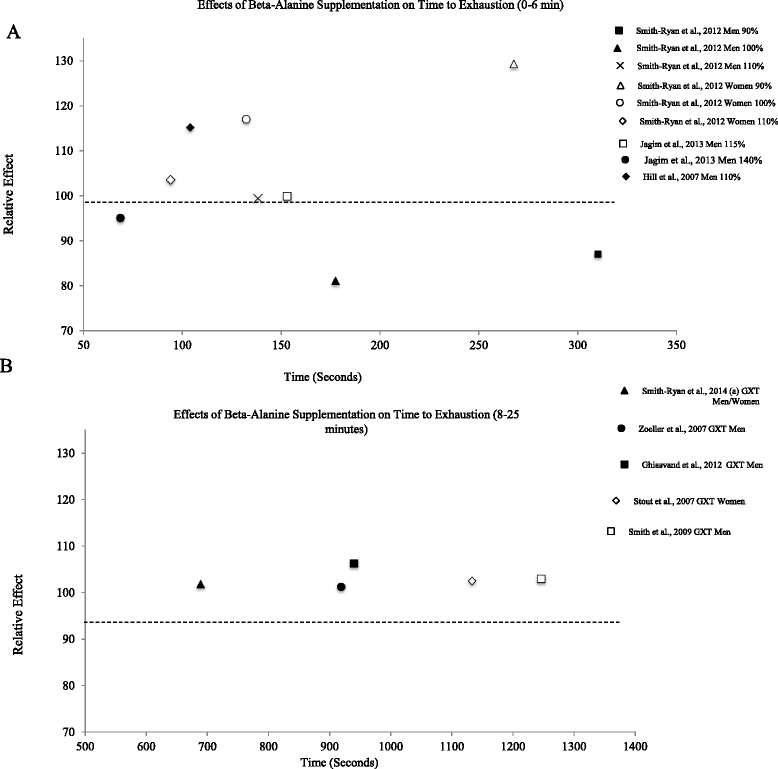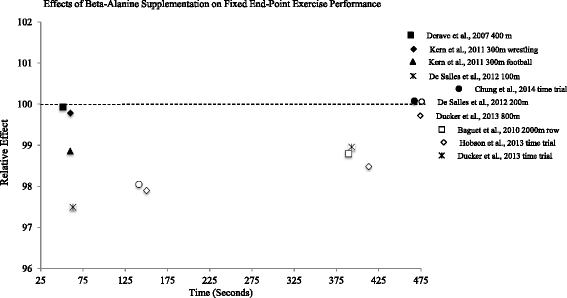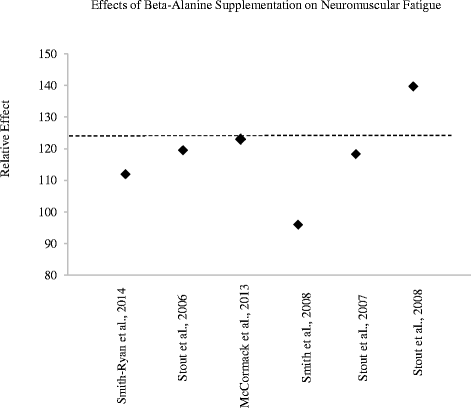International society of sports nutrition position stand: Beta-Alanine - PubMed (original) (raw)
Review
doi: 10.1186/s12970-015-0090-y. eCollection 2015.
Abbie E Smith-Ryan # 1, Jeffrey R Stout 2, Jay R Hoffman 2, Colin D Wilborn 3, Craig Sale 4, Richard B Kreider 5, Ralf Jäger 6, Conrad P Earnest 5 7, Laurent Bannock 8, Bill Campbell 9, Douglas Kalman 10, Tim N Ziegenfuss 11, Jose Antonio 12
Affiliations
- PMID: 26175657
- PMCID: PMC4501114
- DOI: 10.1186/s12970-015-0090-y
Review
International society of sports nutrition position stand: Beta-Alanine
Eric T Trexler et al. J Int Soc Sports Nutr. 2015.
Abstract
The International Society of Sports Nutrition (ISSN) provides an objective and critical review of the mechanisms and use of beta-alanine supplementation. Based on the current available literature, the conclusions of the ISSN are as follows: 1) Four weeks of beta-alanine supplementation (4-6 g daily) significantly augments muscle carnosine concentrations, thereby acting as an intracellular pH buffer; 2) Beta-alanine supplementation currently appears to be safe in healthy populations at recommended doses; 3) The only reported side effect is paraesthesia (tingling), but studies indicate this can be attenuated by using divided lower doses (1.6 g) or using a sustained-release formula; 4) Daily supplementation with 4 to 6 g of beta-alanine for at least 2 to 4 weeks has been shown to improve exercise performance, with more pronounced effects in open end-point tasks/time trials lasting 1 to 4 min in duration; 5) Beta-alanine attenuates neuromuscular fatigue, particularly in older subjects, and preliminary evidence indicates that beta-alanine may improve tactical performance; 6) Combining beta-alanine with other single or multi-ingredient supplements may be advantageous when supplementation of beta-alanine is high enough (4-6 g daily) and long enough (minimum 4 weeks); 7) More research is needed to determine the effects of beta-alanine on strength, endurance performance beyond 25 min in duration, and other health-related benefits associated with carnosine.
Figures
Fig. 1
The relative effects of beta-alanine supplementation on time to exhaustion (TTE) lasting (A) 0–350 s (0–6 min) and (B) lasting 500–1400 s (8–25 min)
Fig. 2
Relative effects of beta-alanine on time trial/fixed end-point exercise performance
Fig. 3
Relative effects of beta-alanine on neuromuscular fatigue (i.e. threshold/workload that can be sustained without fatigue)
Similar articles
- Role of beta-alanine supplementation on muscle carnosine and exercise performance.
Artioli GG, Gualano B, Smith A, Stout J, Lancha AH Jr. Artioli GG, et al. Med Sci Sports Exerc. 2010 Jun;42(6):1162-73. doi: 10.1249/MSS.0b013e3181c74e38. Med Sci Sports Exerc. 2010. PMID: 20479615 Review. - Comparison of Two β-Alanine Dosing Protocols on Muscle Carnosine Elevations.
Church DD, Hoffman JR, Varanoske AN, Wang R, Baker KM, La Monica MB, Beyer KS, Dodd SJ, Oliveira LP, Harris RC, Fukuda DH, Stout JR. Church DD, et al. J Am Coll Nutr. 2017 Nov-Dec;36(8):608-616. doi: 10.1080/07315724.2017.1335250. Epub 2017 Sep 14. J Am Coll Nutr. 2017. PMID: 28910200 Clinical Trial. - Effect of β-alanine supplementation on high-intensity exercise performance.
Harris RC, Stellingwerff T. Harris RC, et al. Nestle Nutr Inst Workshop Ser. 2013;76:61-71. doi: 10.1159/000350258. Epub 2013 Jul 25. Nestle Nutr Inst Workshop Ser. 2013. PMID: 23899755 Review. - Doubling of muscle carnosine concentration does not improve laboratory 1-hr cycling time-trial performance.
Chung W, Baguet A, Bex T, Bishop DJ, Derave W. Chung W, et al. Int J Sport Nutr Exerc Metab. 2014 Jun;24(3):315-24. doi: 10.1123/ijsnem.2013-0125. Epub 2014 Jan 17. Int J Sport Nutr Exerc Metab. 2014. PMID: 24457999 Clinical Trial. - Ergogenic effects of β-alanine and carnosine: proposed future research to quantify their efficacy.
Caruso J, Charles J, Unruh K, Giebel R, Learmonth L, Potter W. Caruso J, et al. Nutrients. 2012 Jul;4(7):585-601. doi: 10.3390/nu4070585. Epub 2012 Jun 26. Nutrients. 2012. PMID: 22852051 Free PMC article. Review.
Cited by
- A Comprehensive Study on the Amino Acids and Tryptophan-Derived Molecules in Iberian Wine Vinegar.
Marques C, Correia E, Aires A, Dinis LT, Vilela A. Marques C, et al. Foods. 2024 Oct 24;13(21):3384. doi: 10.3390/foods13213384. Foods. 2024. PMID: 39517168 Free PMC article. - Comparative effects of caffeine, beta-alanine, and their combination on mechanical, physiological, and perceptual responses to upper-body superset resistance training.
Martos-Arregui A, Li Z, Miras-Moreno S, Marcos-Frutos D, Jiménez-Martínez P, Alix-Fages C, Janicijevic D, García-Ramos A. Martos-Arregui A, et al. Eur J Appl Physiol. 2024 Oct 22. doi: 10.1007/s00421-024-05639-4. Online ahead of print. Eur J Appl Physiol. 2024. PMID: 39438314 - The Top 5 Can't-Miss Sport Supplements.
Antonio J, Pereira F, Curtis J, Rojas J, Evans C. Antonio J, et al. Nutrients. 2024 Sep 26;16(19):3247. doi: 10.3390/nu16193247. Nutrients. 2024. PMID: 39408214 Free PMC article. Review. - Global hotspots and trends of nutritional supplements in sport and exercise from 2000 to 2024: a bibliometric analysis.
Fu T, Liu H, Shi C, Zhao H, Liu F, Xia Y. Fu T, et al. J Health Popul Nutr. 2024 Sep 12;43(1):146. doi: 10.1186/s41043-024-00638-9. J Health Popul Nutr. 2024. PMID: 39267150 Free PMC article. Review. - Physiological and performance adaptations to beta alanine supplementation and short sprint interval training in volleyball players.
Guo W, Wang S. Guo W, et al. Sci Rep. 2024 Jul 22;14(1):16833. doi: 10.1038/s41598-024-67974-y. Sci Rep. 2024. PMID: 39039103 Free PMC article. Clinical Trial.
References
- Dunnett M, Harris RC. Influence of oral beta-alanine and L-histidine supplementation on the carnosine content of the gluteus medius. Equine Vet J Suppl. 1999;30:499–504. - PubMed
- Harris RC, Jones G, Hill CH, Kendrick IP, Boobis L, Kim CK, et al. The carnosine content of vastus lateralis in vegetarians and omnivores. FASEB J. 2007;21:76.20. doi: 10.1096/fj.06-6925com. - DOI
Publication types
MeSH terms
Substances
LinkOut - more resources
Full Text Sources
Other Literature Sources


